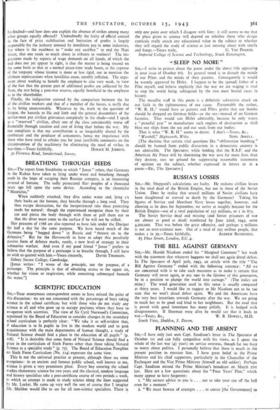SCIENTIFIC EDUCATION Six,—Your anonymous correspondent seems to have missed the
point of this discussion: we are not concerned with the percentage of boys taking science in the school certificate but with those who do not study any science at all and who grow up to occupy positions where they have to • co-operate with scientists. The view of Sir Cyril Norwood's Committee, appointed by the Board of Education to consider changes in the secondary school curriculum is perfectly clear: "We take it as self-evident that, if education is to fit pupils to live in the modern world and to gain acquaintance with the main departments of human thought, a study of Natural Science should find a place in the education of all pupils " (p. lo8). " It is desirable that some form of Natural Science should find a place in the curriculum of Sixth Forms other than those taking Natural Science as a specialist study" (p. 75). The Board of Education Pamphlet on Sixth Form Curriculum (No. 114) expresses the same view.
This Is not the universal practice at present, although there are some exceptions: in an ancient and famous public school, well known to me, science is given a very prominent place. Every boy entering the school studies elementary science for two years and the classical, modern language and history specialists take a post-certificate course of two periods a week, in which an attempt is made to study science along the lines suggested bY Mx. Locket. He sums up very well the sort of course that I imagine Mr. Sheldon would like to see for all non-science specialists. There is
only one point over which I disagree with him: it still seems to me that the place given to science will depend on whether those who design curricula really attach any educational value to the subject or whether they still regard the study of science as just messing about with smells


























 Previous page
Previous page